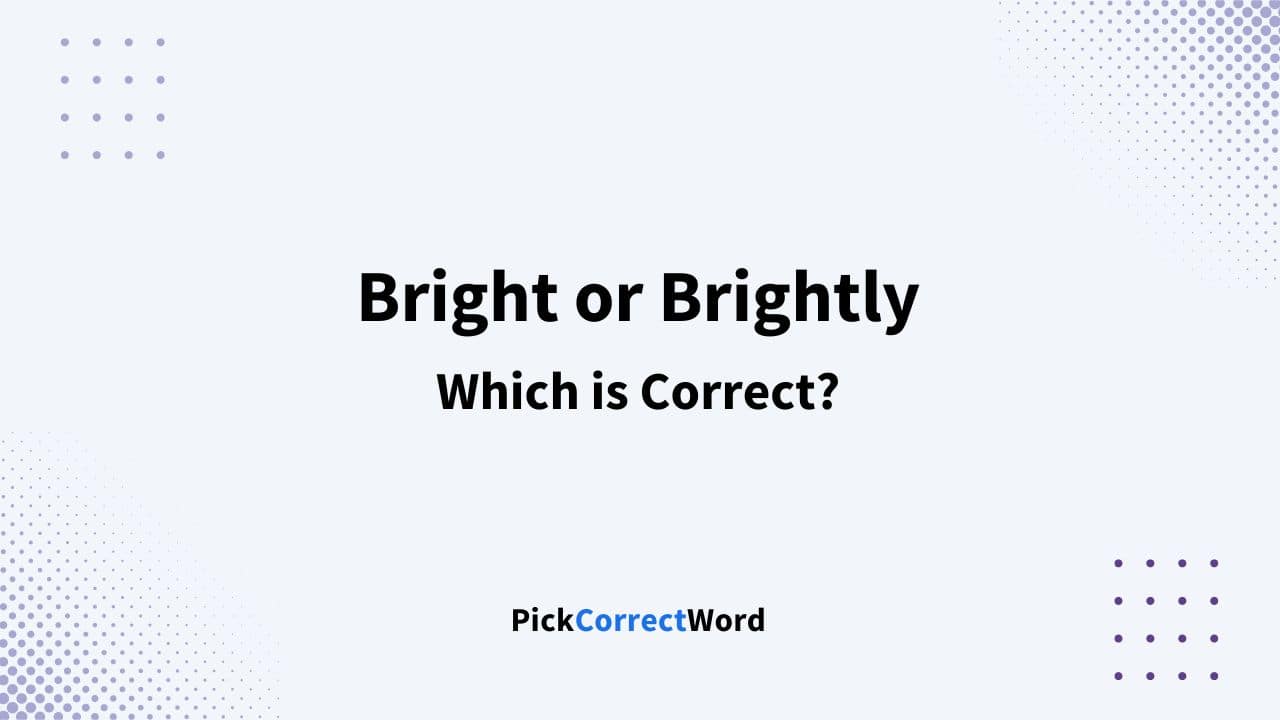Figuring out when to use ‘bright’ and ‘brightly’ can be confusing. So, how do you figure out which one to use: bright or brightly?
Use ‘bright’ when you’re talking about how something looks or feels. For example, if there’s a lot of light in a room, you’d say it’s bright.
But when you want to describe the way something is done or happens, use the word ‘brightly.’
Remember, neither word is wrong. The key is choosing the right one for what you’re trying to say.
Bright or Brightly: Which is Correct?
Both ‘bright’ and ‘brightly’ are correct, but they have different meanings and roles in a sentence.
‘Bright’ is an adjective, which means it gives more information about a noun or pronoun. Like when you say, “The stars are bright,” here ‘bright’ is describing the stars.
- Adjective: Bright (e.g., bright colors, bright light)
- Example: The moon is bright tonight.
On the other hand, ‘brightly’ is an adverb, and its job is to give more details about verbs, adjectives, or other adverbs. It tells you how something is done. So, when you say, “The stars shine brightly,” ‘brightly’ is explaining how the stars are shining.
- Adverb: Brightly (e.g., smile brightly, shine brightly)
- Example: The moon shines brightly in the night sky.
Can bright and brightly be used interchangeably?
No, ‘bright’ and ‘brightly’ cannot be used interchangeably.
Bright’ is an adjective and ‘brightly’ is an adverb. They each have distinct grammatical roles and meanings and cannot be used in place of each other.
Exception: Sometimes, “bright” is also used informally as an adverb, especially in poetic or creative writing. For example:
- The moon shines bright above.
Bright: Meaning and Usage
You generally use “bright” to talk about something that radiates or reflects light, making it seem illuminated or vivid.
For instance, on a sunny day, you might say,
- “The sun is bright in the sky”
Or, if someone’s eyes sparkle with joy, you might compliment them by saying,
- “You have really bright eyes“
In a different context, “bright” also refers to colors that are of high saturation and intensity.
- “The painter used bright colors to create a vibrant scene, full of energy and life.”
When you talk about feelings or smarts, “bright” can have a more symbolic meaning. If someone has a positive attitude, you could say they have a bright personality, suggesting they’re happy and cheerful.
- “She has a bright personality that spreads joy everywhere she goes”
Similarly, if you consider someone to be quick to learn or understand, you could say that person is bright or intelligent.
- “She is a really bright kid who grasps everything quickly”
Brightly: Meaning and Usage
The adverb “brightly” refers to the manner in which a light source is emitting light.
If a lamp is emitting a strong, clear light, you would say, “The lamp shone brightly.” Here, “brightly” is modifying how the lamp is shining, which is the action or the verb of the sentence.
To break down the grammar:
- “Brightly” is an adverb, meaning it adds more information to the verb.
- It answers the question of how something is done.
When using “brightly,” you’re specifically addressing how something shines, sparkles, or appears visually in terms of light.
Examples of Using “Bright“ in A Sentence
“Your new phone’s screen is incredibly bright.“
“The stars were bright in the countryside sky.”
“Wear sunglasses when the sun is too bright.”
“Her bright idea solved the complex problem.”
“Your dress is the most bright shade of red.”
Examples of Using “Brightly“ in A Sentence
“The stars twinkled brightly in the night sky.“
“Your necklace glimmers brightly even from across the room.“
“During the festival, the streets are brightly lit with lanterns.“
“You colored the picture so brightly; it’s very cheerful.“
“The moon shone brightly, illuminating the pathway home.“


